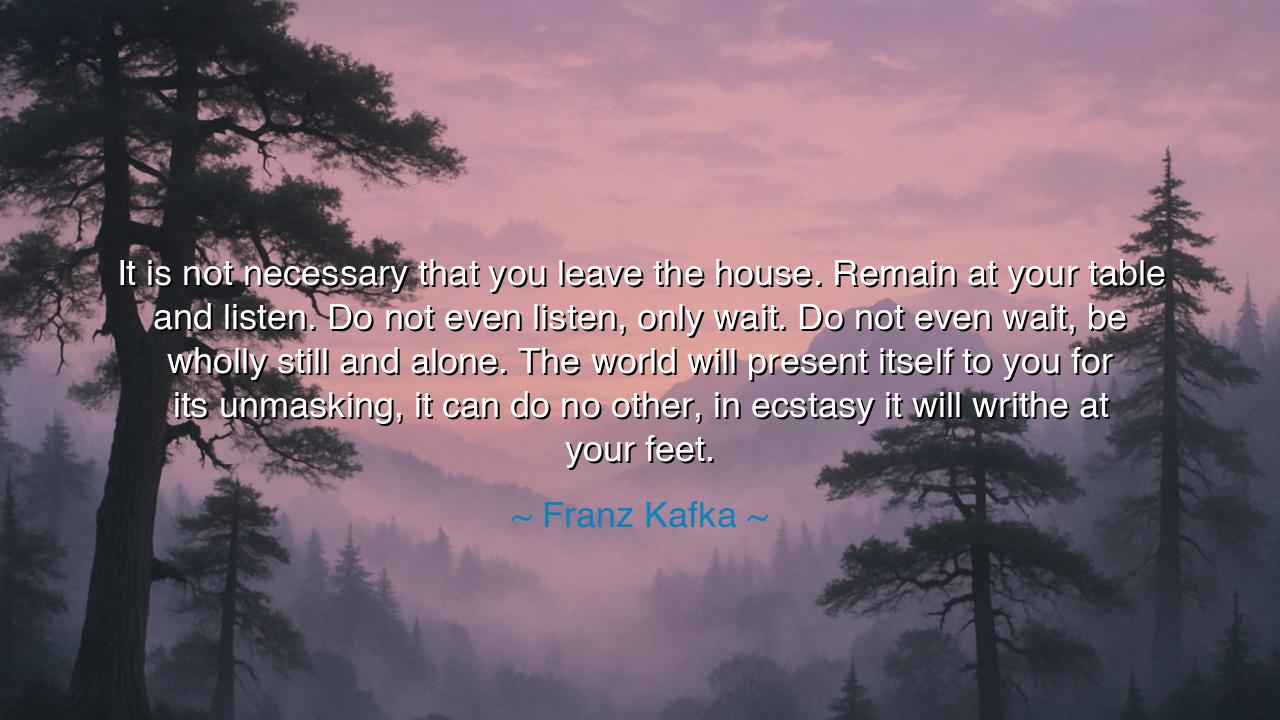
It is not necessary that you leave the house. Remain at your
It is not necessary that you leave the house. Remain at your table and listen. Do not even listen, only wait. Do not even wait, be wholly still and alone. The world will present itself to you for its unmasking, it can do no other, in ecstasy it will writhe at your feet.






In the haunting and luminous words of Franz Kafka, we encounter a teaching that seems both strange and divine: “It is not necessary that you leave the house. Remain at your table and listen. Do not even listen, only wait. Do not even wait, be wholly still and alone. The world will present itself to you for its unmasking, it can do no other, in ecstasy it will writhe at your feet.” Here, Kafka — the poet of silence and the prophet of the unseen — reveals a paradox of the soul: that the deepest truths are not found in restless striving, but in stillness; that the world reveals itself not to the one who hunts it, but to the one who waits in reverent quiet.
The origin of this insight lies in Kafka’s own life — a man of solitude and introspection, whose words carried more power than armies and whose imagination pierced the veil of existence. He lived much of his life in obscurity, a clerk by day, a visionary by night, wrestling not with the world outside, but with the shadows within. Yet in his solitude, he touched something eternal. He came to understand that truth, beauty, and revelation do not bow to the frantic or the forceful. They come, instead, to the one who sits humbly before the mystery of life and dares to be still.
In these words, Kafka speaks of a sacred posture — the stillness of the soul before creation. He tells us not to chase meaning, but to allow it to come. To “remain at your table” is to stay rooted in yourself, to resist the urge to flee into the distractions of the world. To “listen” is to quiet the noise of thought, to make of the mind a vessel, not a weapon. And when he says, “Do not even wait,” he calls for a surrender so complete that even the expectation of revelation dissolves. For true awakening comes only when the ego — the impatient seeker — is silent. In that moment, the world unmasks itself, and reality, in its raw ecstasy, reveals its infinite face.
The ancients, too, knew this secret. The mystics of India spoke of the sage who sits in stillness until truth blossoms within him like a lotus. Lao Tzu wrote that “those who know do not speak; those who speak do not know.” Even Socrates, that tireless questioner, believed that wisdom begins not in knowledge, but in humility — in knowing that one does not know. Kafka’s stillness is not laziness; it is the ultimate form of attentiveness. It is not withdrawal from the world, but immersion in its essence. For the world hides its meaning from those who chase it, yet offers it freely to those who are present enough to receive it.
Consider the story of Isaac Newton, who, after years of feverish labor, discovered the law of gravity not in a laboratory, but while sitting silently beneath an apple tree. It was in that quiet moment, when thought had ceased and observation deepened, that truth descended upon him like a revelation. Or think of Buddha, who sought enlightenment through hardship and wandering, until at last he sat beneath the Bodhi tree — still, unmoving, surrendered — and the world unmasked itself before him. These are the living embodiments of Kafka’s vision: that when the mind becomes still, the universe kneels to whisper its secrets.
Yet Kafka’s words are not only for mystics and philosophers. They are for all who live in an age of noise — an age that fears silence as if it were death. He calls to the one lost in distraction, the one who runs endlessly toward goals yet feels no peace. “Do not leave the house,” he says, not to imprison, but to liberate. For to be still, even for a moment, is to rediscover one’s center, to hear the quiet pulse of existence beneath the roar of the world. When we cease striving to control life, life begins to reveal itself — not as an enemy to be conquered, but as a mystery to be embraced.
Therefore, my child, learn the art of stillness. Sit quietly at your table, whatever that table may be — your place of labor, of thought, of prayer. Do not rush to speak or act. Listen — and then, do not even listen. Let go of the need to grasp, and open yourself instead to presence. The world, tired of being chased, will come to you in its own time. It will unmask itself not to your intellect, but to your soul. And when it does, it will not merely speak — it will writhe in ecstasy at your feet, for it has found one who finally sees it as it is.
So let Kafka’s words be your compass in this restless age: that revelation does not come through conquest, but through surrender. The door to truth does not open outward, but inward. Be still, and you will find that the universe — vast, eternal, and alive — was never beyond your reach. It was waiting, always, within you.






AAdministratorAdministrator
Welcome, honored guests. Please leave a comment, we will respond soon